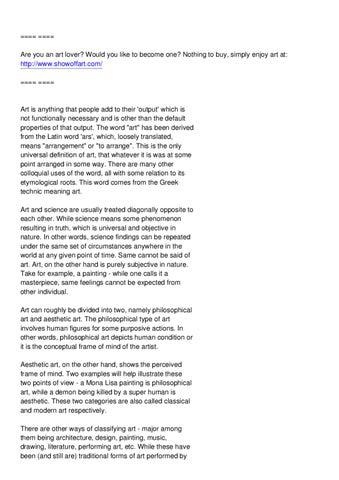How To Appreciate Art In Words
Art appreciation
is an important subject, and I hear that it is a topic that many teachers struggle with as they try to provide valuable and interesting opportunities for their students.
Why is this so? Well, most of us can try and appreciate fine art for free. However, having a
non-academic
appreciation of visual arts is more difficult.
I work in education, and I’m a big fan of all things art. As such, when I got the opportunity to speak with some artists for BBC Radio 4’s Songs of Praise program I jumped at the chance!
I love to speak to artists and have found that artists have something that can’t be translated into words.
I’m a person that loves words. I’m a novelist by trade, and I write a lot of articles on my blog.
I’ve concluded that all great writers have a really good understanding of the English language, and this is because words are the basis of art appreciation.
It’s pretty difficult to appreciate art when you’re unable to read or write
It’s certainly a bit difficult for me, as I can read and write, and I love words. But, it’s not the same when you can’t read or write the artist’s language.
As a teacher, I really value the power of words in education, because they are the gateway to understanding all things.
If I can’t share my students’ thoughts with them, then how can I share my thoughts about the latest
Breaking Bad
episode with them?
This means I have to talk about things they don’t understand – things like media and culture.
If I’m a teacher, then I also have to spend a lot of time thinking about ways in which I can connect and understand my students – and this includes the things that they aren’t able to understand and appreciate.
How art invented the world
The name Walter Murch, for those of you that don’t know, is a very famous film editor.
Murch has an extensive list of credits as an editor and has created an impressive body of work that includes The Terminator, Gladiator, and The Godfather Part II.
You might also be aware that Murch was an early supporter of the found-footage genre and an influential part of the birth of the found-footage horror sub-genre in the 1990s with the movies Night of the Creeps and The Devil Inside.
Now, after having the benefit of working alongside and learning from such luminaries as Murch, the question becomes why do I care about Murch?
The reason I write about Murch is that he is one of the most influential men in my life. And, there’s a reason I’m writing about him.

i dont know how to word this how i want to ahhhhh like if a film is beautifully made but the plot is very dark and… https://t.co/8lWws2bJrb
— 𝓴 Sun Feb 07 02:32:03 +0000 2021
Over the years I’ve had several teachers that had an extraordinary capacity for learning and understanding the art of my students.
Why do I want to write about Murch?
Well, because he was able to do exactly what all good teachers need to do – relate to and understand the needs of my students.
Murch was also able to share and inspire his students through the words that he created.
His art didn’t create an understanding, but his words inspired his students to create and absorb art that inspired them.
It is that power of words that will help my students become more creative and learn to appreciate art, just as Murch was able to share his work to inspire and share art that he was inspired by.
And what I mean is, that, when students learn that the greatest contribution that humans have ever made to the planet is…or rather was…words, and when they can appreciate that by understanding the art of another artist, then I’m telling you that we are well on the way to a brighter future.
I guess the power of words is like the power of music. When a musician can create a song that can move people, how can a teacher not feel their talent is being shared by the kids around them?
Every art form is founded on a particular and unique language, and words are the foundation on which these languages are built.
Think about it.
How can you listen to a song without understanding the words that the artist is singing?
If you don’t understand the language, then you can’t experience the meaning and the message behind the song.
In my case, I use books and art. When I teach a student how to read and write, I am effectively teaching them to learn to create a language that is not based on the spoken word, but the written word.
There is one other power that words have to influence us as a society.
Here’s a figure that’s based on a famous theory by Joseph Weizenbaum, and it goes something like this:
Theory: The human mind is one vast computational system. This system can be broken down into many sub-systems, and each of these sub-systems can be understood by a computer.
Theory: The human mind can be tricked into thinking that it is interacting with a computer and that these interactions are the defining element of the human mind.
Someone can convince you that there is an
inter-dimensional
being or a technological reality that does not exist.
For a long time, this was a fringe theory, but thanks to the development of computers and the Internet, we are living in the era of the theory of anthropomorphism.
With each passing day, we find that people are being fooled into believing that they are interacting with these mythical monsters or beings that are designed to appear as humans.
